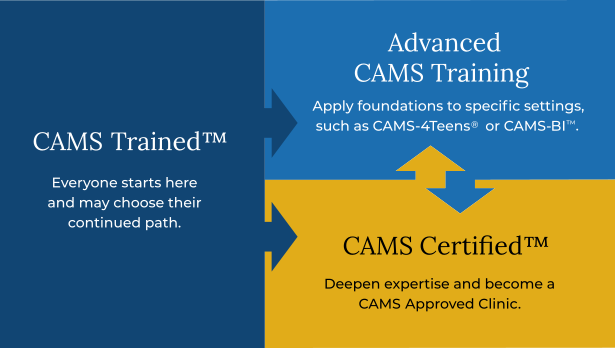Provide clinical suicide treatment training to your emergency staff by implementing a hospital protocol for suicidal patients using CAMS.
Training is available for:
- Crisis response teams
- Emergency department providers
- Nurses
- Psychologists
- Social workers
- Graduate students and peer support workers under supervision
Why Hospitals Need Clinical Suicide Prevention Training
In recent years, hospitals and emergency departments have seen many patients in crisis. They often lack the resources to treat them properly and on time. Many times, patients dealing with a mental health crisis are triaged over and may not get a clear disposition plan to follow once they’re released from the hospital. Multiple studies suggest that once discharged, their risk for suicide goes up significantly.1 Studies also show that 30% of patients who go to the ED for a suicide-related concern return within a year2 and most do not follow discharge plans for follow up care.
Currently, EmPATH units are helping offer an alternative solution to some of the overwhelming number of patients that emergency departments see on a daily basis. EmPATH units are specialized emergency department extensions designed to provide compassionate and appropriate care for those facing a mental health crisis. Whether your hospital has an EmPATH unit or not, CAMS training can help improve outcomes at your facility.
Case Study: Colorado’s Blueprint for Suicide-Specific Care
In 2024, the Pediatric Mental Health Institute (PHMI), a department within Children’s Colorado, developed a groundbreaking outpatient Crisis Services strategic plan, enhanced by the CAMS Framework®. Their Crisis Clinic has since been helping transform mental health for youth across the state through accessible and tailored outpatient services.
How CAMS Can Help
CAMS is a proven solution that focuses on suicide prevention. It offers clinical training for handling suicidal risk. This training is useful in many hospital settings, such as inpatient care and emergency departments. CAMS is used in both inpatient and outpatient settings. It focuses on keeping the individual safe. At the same time, it helps understand why they are struggling. This understanding helps create a treatment plan for the future. CAMS has also shown a significant reduction in suicidal ideation for those who have been discharged.3
Benefits of Suicide Prevention Training for Healthcare Professionals with CAMS
Cost-Effective Solution
Implementing CAMS can help save hospitals money. Rather than needing to expand due to demand, CAMS can help hospitals and emergency departments reduce patient recidivism while improving quality of care.
Can Help Reduce Malpractice Risk
CAMS greatly lowers the risk of malpractice. It does this by using detailed medical record documentation. This is done with a tool called the Suicide Status Form. Using CAMS and related SSF documentation can help staff feel feel more confident and competent to treat suicidal risk which positively impacts patients as well.
Shared Language
When CAMS is being used in a system of care, it creates a shared language for each provider who works with the patient moving forward. This helps ensure that the patient is getting the best care possible at each stage of their treatment journey.
A Clear Path Forward for Patients
Recovery is always the end goal. By training hospital staff in suicide treatment with CAMS, you are helping patients receive a clear and direct path for optimal treatment and recovery from suicidal suffering.
How CAMS Provides Clinical Suicide Prevention Training in Hospitals
CAMS offers clinical suicide treatment training specifically designed to be used in hospitals and emergency departments. Everyone first becomes CAMS Trained™. After receiving the CAMS Trained designation, you and your team can enroll in Advanced CAMS training programs that take your CAMS knowledge further.
CAMS Brief Intervention (BI) is a training specifically designed for those working in emergency departments and hospitals. When using CAMS-BI™, you help set patients up for success by creating a personalized treatment plan and referral for outpatient care. These shorter, one-hour consultations have a quick effect. About 58% of patients say they feel less distressed and more hopeful.

As a clinician who has lost a loved one to suicide, I can vouch for CAMS being not only instructive but also personally healing in helping me feel like I CAN help people who think of suicide.
Evan Merida, MA, LPC, NCC
Sun and Shade Counseling, Denver, CO
The approach of sitting with a client’s thoughts of self harm without immediately jumping to hospitalization has led to better outcomes — both because I’m more confident to stay in that space with them and because that willingness creates a greater trust between us.
CAMS Trained Clinician
Frequently Asked Questions
Yes. The CAMS Framework® (Collaborative Assessment and Management of Suicidality) is grounded in 40+ years of rigorous clinical research, including 11 open trials, 7 randomized controlled trials, and 2 meta-analyses. It’s endorsed by the CDC, Joint Commission, Surgeon General, featured in the 2024 National Suicide Prevention Strategy, and integrated into Zero Suicide initiatives worldwide. (CAMS-care)
The core CAMS Trained™ program includes 10 hours of structured online coursework plus 4 hours of consultation calls, designed to equip clinicians to apply CAMS effectively with their first patient. Most clinicians earn their CAMS Trained designation in around 30 days. (CAMS-care)
Clinical suicide prevention training involves structured instruction and supervised practice enabling clinicians to assess, collaborate, and intervene with individuals at risk for suicide. CAMS-centered training teaches providers to co-create safety plans, identify underlying drivers of suicidal thoughts, and document treatment using the evidence-based Suicide Status Form in as few as 6–8 therapeutic sessions. (CAMS-care)